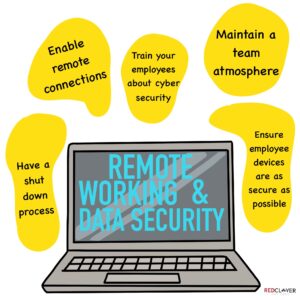There’s a lot of uncertainty in the world right now.
A global pandemic, major lifestyle changes, and increased isolation have turned our business worlds upside down. One thing remains certain, though. Red Clover Advisors is committed to providing trusted and practical privacy consulting services to our business community.
By taking careful precautions and acting with sober judgement when it comes to remote work, we believe that together, our businesses can grow stronger and more resilient during this time.
Remote Work Best Practices
While the world is on lockdown, we get to connect more than ever online through the modern miracle of remote work. This presents a plethora of opportunities for your team to grow while getting creative about new ways to conduct business.
However, there are also a lot of new ways privacy and security risks can creep in and put your company in danger.
As always, our team is prepared to help.
In particular, we want to outline some of the privacy and security areas related to remote work that may affect your business. There are specific legal and practical steps you should be taking to keep your customers, your employees, and your business safe when it comes to remote work.
Virtual Meetings
Conference calls and web meetings – aka virtual meetings – are at the center of making remote work successful. You’ll need to connect with colleagues and clients in order to move projects forward.
There are major implications for virtual meetings, though.
Just think about the situations when one meeting runs over, and the callers who dial in for the next meeting – on the same conference line – unwittingly overhear proprietary, client-specific, or competitor information. That’s a big no-no.
Virtual meetings must be set up correctly and procedures followed to a tee to avoid these unwanted privacy blunders from happening. Follow this checklist to make sure you’re doing it properly:
- Have a separate code for each virtual meeting you set up.
- Schedule meetings to end at 25 or 40 or 55 minute intervals. The extra five minutes will give users time to log off before new users log on.
- Set a timer to make sure you don’t run over meeting times.
Although virtual meetings tend to be quicker than in-person versions, you should still take extra precautions to make sure they end on time for the sake of protecting sensitive information. This ensures your remote work will increase collaboration without causing an embarrassing or costly security or privacy incident.
Remote Work Connections
VPNs and intranets are essential for successful remote work. When they’re set up correctly, it makes a security issue far less likely.
If your company doesn’t have a process for setting up a secure VPN, now is the time to create one. It should be reviewed by executives and technical experts on your team. And everyone in your company should be trained about how to use it.
Other tips for keeping connections and data secure include:
- Best practice dictates not allowing employees to use their personal devices for work activities. If they do, it’s critical they follow all the following steps.
- Don’t allow employees to use public WiFi without a VPN.
- Install the proper software, firewalls, and connections securities required by your industry on employees’ work devices.
- Consider adding two-factor authentication to employees’ work devices and any tools from which they access work content. Google Authenticator, Ping ID and Authy all sync with hundreds of apps commonly used to protect data.
- Make sure employees are aware of who can see their screens when working offsite. Screens shouldn’t be visible to others, especially when entering passwords.
One of the silver linings to the remote work cloud is the companies stepping up to provide free security resources to help organizations better protect their networks during this time.
Disinformation and Deepfakes
Even if your business is internally secure while pursuing remote work, outside threats are taking advantage of the situation. Fake news and deepfakes are at the center of this conspiracy.
A deepfake is Photoshopping for video. Using a form of artificial intelligence (AI) called deep learning, creators make videos of fake events, often superimposing faces on bodies. They’re common and convincing.
Fake news and deepfakes can be weaponized to harm brands and undermine trust in companies and industries. It’s a possibility your company could be targeted by this disinformation while working remotely. It’s important you understand legal actions that can be taken against the perpetrators, as well as how to prepare and react to exposure of this kind.
Preparation is Your Ally
While businesses aren’t defenseless in this new remote work environment, protecting customers and individuals will require forward thinking, preparation, and diligence. Red Clover Advisors is here to help you navigate these issues and other topics as they arise.
We’ve created The Remote Work Best Practices Guide to give you a detailed rundown of privacy and cybersecurity challenges to watch out for.
It’s a practical checklist you can implement with your remote work team today.
Please reach out if we can help explain any of these concepts or help you work through them. During this unprecedented time, we are thinking of you, your families, and your teams. We’re all in this together, and our team is prepared to provide assistance in all the ways we can.
